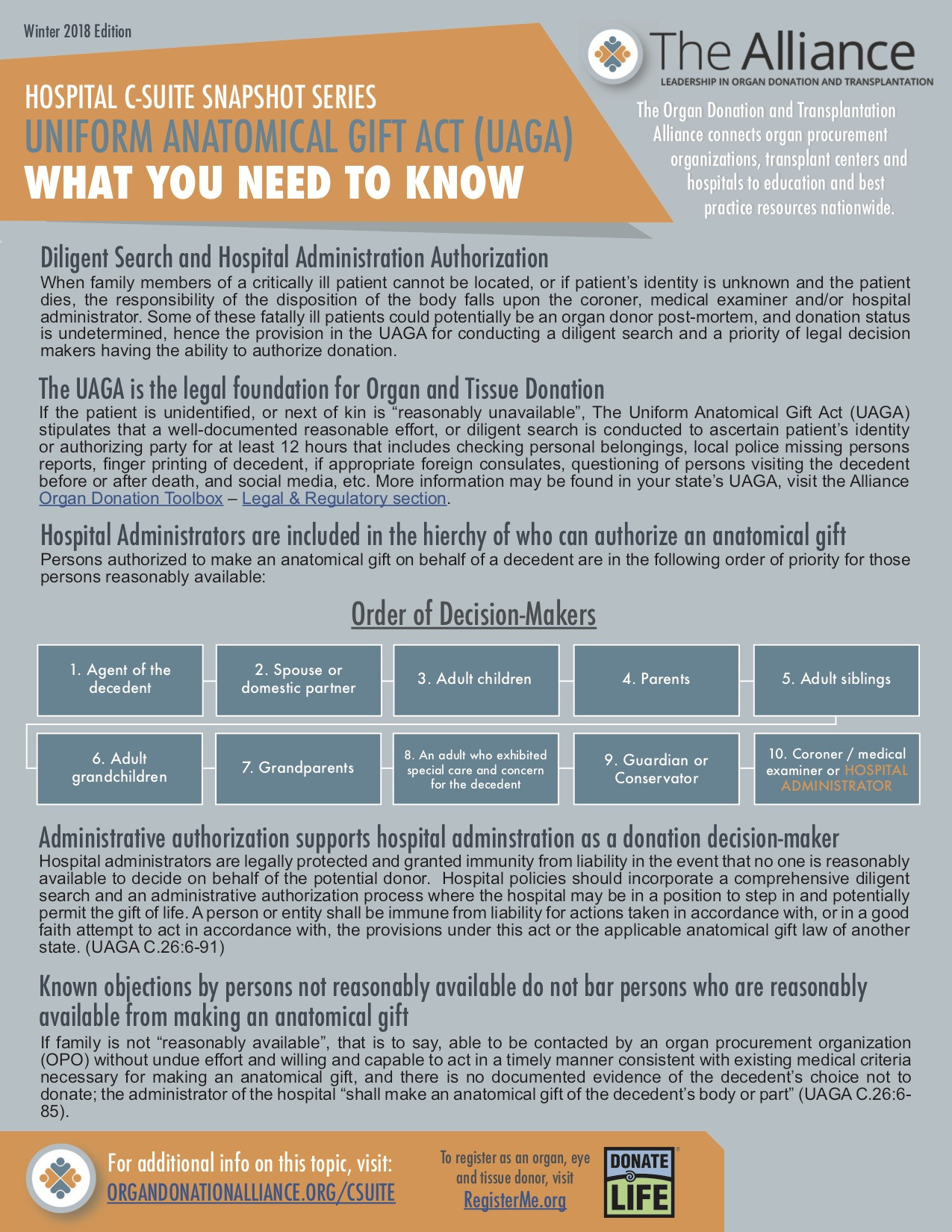The Uniform Anatomical Gift Act (UAGA) serves as the cornerstone of organ and tissue donation in the United States, providing a legal framework that addresses critical situations, particularly when family members of a deceased patient are unreachable or unidentified. In these challenging circumstances, the responsibility for the disposition of the body often falls to the coroner, medical examiner, and hospital administrator. This article delves into the crucial role of hospital administrators within the UAGA, especially concerning their authority to authorize anatomical gifts when traditional decision-makers are not available.
Understanding the Uniform Anatomical Gift Act (UAGA)
The UAGA is the bedrock of the legal system governing organ and tissue donation, designed to streamline the donation process and honor the potential for life-saving transplants. A key provision within the Act addresses scenarios where a patient’s organ donation status is undetermined, and their family cannot be located. In such cases, the UAGA mandates a “diligent search” to identify the patient or locate legal decision-makers who can authorize donation. This search is paramount to ensure that the opportunity for donation is not missed simply due to logistical challenges in contacting family.
According to the UAGA, if a patient is unidentified or their next of kin is deemed “reasonably unavailable,” a meticulously documented diligent search must be conducted for at least 12 hours. This comprehensive search includes several key steps aimed at ascertaining the patient’s identity or finding an authorizing party. These efforts involve examining personal belongings for identification, checking local police missing persons reports, and when appropriate, utilizing fingerprinting to identify the deceased. Furthermore, outreach to relevant foreign consulates and inquiries directed towards individuals who visited the patient before or after death are essential components of this process. In today’s digital age, social media platforms are also considered valuable resources in the diligent search. For detailed information, refer to your state’s specific UAGA guidelines, accessible through The Alliance Community Resource Toolbox – Legal & Regulatory section.
Hospital Administrators as Authorized Decision Makers under UAGA
The UAGA explicitly includes hospital administrators within the hierarchy of individuals authorized to make an anatomical gift on behalf of a deceased person. This inclusion recognizes the administrative realities within hospital settings and empowers administrators to act decisively when traditional family decision-makers are not accessible. The Act establishes a clear order of priority for those who can authorize an anatomical gift, prioritizing reasonably available individuals.
 Hierarchy of authorized persons for anatomical gift under UAGA
Hierarchy of authorized persons for anatomical gift under UAGA
Administrative Authorization and Legal Protection
Administrative authorization, as sanctioned by the UAGA, provides essential support to hospital administrators in making critical organ donation decisions. This provision acknowledges that administrators may sometimes be the only available and responsible party capable of facilitating the donation process when family members cannot be reached or identified. Crucially, the UAGA extends legal protection and immunity from liability to hospital administrators who act in accordance with the Act or in a good-faith attempt to do so. This legal safeguard is vital, ensuring that administrators can proceed with donation authorization without fear of legal repercussions in these challenging circumstances. The specific legal citation for this protection is UAGA C.26:6-91, which underscores the Act’s commitment to supporting and protecting those who facilitate organ donation.
Conditions for Hospital Administrative Authorization
The UAGA clarifies the conditions under which hospital administrators are authorized to make anatomical gifts. The Act addresses the concept of “reasonably unavailable” family, defining it as a situation where family members cannot be contacted by an Organ Procurement Organization (OPO) with reasonable effort, or are unwilling or unable to act promptly in alignment with the medical criteria necessary for organ donation. Furthermore, if there is no documented evidence indicating that the deceased person was opposed to organ donation, the administrator of the hospital is legally mandated to “make an anatomical gift of the decedent’s body or part” (UAGA C.26:6-85). This provision emphasizes the proactive role of hospital administrators in ensuring that the potential for organ donation is realized when no other authorized party is available and willing to act.
In conclusion, the Uniform Anatomical Gift Act strategically positions hospital administrators as vital decision-makers in the organ donation process, particularly in scenarios involving unidentified patients or when families are not reasonably available. The UAGA’s diligent search requirement and the explicit authorization granted to hospital administrators, coupled with legal protections, collectively aim to maximize opportunities for life-saving organ and tissue donation. Hospital policies should comprehensively reflect these provisions to ensure a robust and compassionate approach to organ donation in all circumstances.

